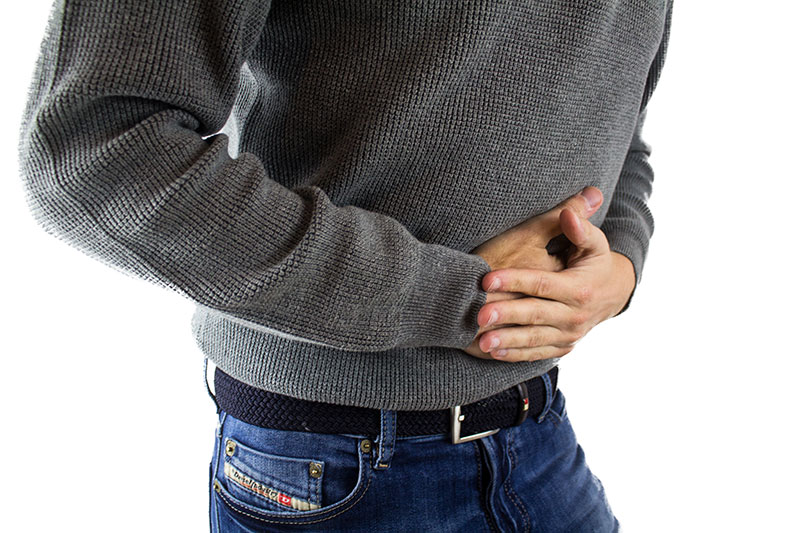Did you know that acid reflux, bloating, indigestion, nausea and belching (especially after meals), constipation, diarrhoea and small intestine bacterial overgrowth (SIBO) are common symptoms of low stomach acid?1-3
What is low stomach acid?
Stomach acid facilitates protein digestion, the absorption of iron, calcium and vitamin B1; and prevents bacterial overgrowth. Low levels of stomach acid (hypochlorhydria) can lead to vitamin and mineral deficiencies (e.g. vitamin B12, iron, calcium and magnesium)4, and increased risk of food allergies5 and SIBO3.
What can cause it?
• Antacids and anti-ulcer medications6
• Advanced age6
• Helicobacter pylori bacteria infection7
• Stress8
How to test your stomach acid at home *
1. Take one 500mg capsule of betaine HCl before a protein-containing meal (when you are most hungry and therefore when your stomach acid is highest). You have sufficient stomach acid if you experience a tingling, burning sensation similar to heartburn. Re-test this a few times to confirm. Any feeling of discomfort can neutralize with one tsp baking soda with water or milk.
2. If there is no tingling/burning sensation, take two capsules with each meal.
3. Increase the number of capsules every two days up to a maximum of five capsules with each meal if necessary; and for a maximum of one week.
4. When you experience the tingling/burning sensation, this indicates an excessive dose, and your level of HCl deficiency.
5. If HCl deficiency is found, it may be useful to supplement with betaine HCl to maximize absorption of nutrients. Smaller meals may require less HCl, so the number of capsules should be reduced accordingly. Supplementation should be administered under the guidance of qualified nutritionist.
*Referenced from the Institute for Functional Medicine
HOW TO BOOST YOUR STOMACH ACID
• Manage chronic stress8
• Mindful eating and chewing9
• Betaine HCl supplements10
• Traditional remedies such as apple cider vinegar and bitter, aromatic and pungent plants (i.e. ginger, peppermint, aniseed and fennel, citrus fruits, dandelion and artichoke) can be useful in supporting digestion11.

References
1. Ramsey, E.J., Carey, K.V., Peterson, W.L., Jackson, J.J., Murphy, F.K., Read, N.W., Taylor, K.B., Trier, J.S. and Fordtran, J.S., (1979). Epidemic gastritis with hypochlorhydria. Gastroenterology, 76(6), pp.1449-1457.
2. Schubert, M.L. and Peura, D.A., (2008). Control of gastric acid secretion in health and disease. Gastroenterology, 134(7), pp.1842-1860.
3. Dukowicz AC, Lacy BE, Levine GM. (2007). Small intestinal bacterial overgrowth: A comprehensive review. Gastroenterol Hepatol. ;3(2):112–122.
4. Ito T, Jensen RT. (2010). Association of long-term proton pump inhibitor therapy with bone fractures and effects on absorption of calcium, vitamin B12, iron, and magnesium. Curr Gastroenterol Rep. 12(6):448–457.
5. Pali-Schöll, I., Herzog, R., Wallmann, J., Szalai, K., Brunner, R., Lukschal, A., … Jensen-Jarolim, E. (2010). Antacids and dietary supplements with an influence on the gastric pH increase the risk for food sensitization. Clinical and experimental allergy: journal of the British Society for Allergy and Clinical Immunology, 40(7), 1091–1098. doi:10.1111/j.1365-2222.2010.03468.x
6. Dalziel, G., Dean, B.J., Dresser, M.J., Frymoyer, A., Holden, S.N., Jin, J.Y., Ware, J.A. and Benet, L.Z., Genentech Inc, (2013). Treatment of pharmacological-induced hypochlorhydria. U.S. Patent Application 13/650,274.
7. Lahner, E., Annibale, B. and Delle Fave, G., (2009). Systematic review: Heliocobacter pylori infection and impaired drug absorption. Alimentary pharmacology & therapeutics, 29(4), pp.379-386.
8. Esplugues, J. V., Barrachina, M. D., Beltrán, B., Calatayud, S., Whittle, B. J., & Moncada, S. (1996). Inhibition of gastric acid secretion by stress: a protective reflex mediated by cerebral nitric oxide. Proceedings of the National Academy of Sciences of the United States of America, 93(25), 14839–14844.
9. Zafra, M.A., Molina, F. and Puerto, A., (2006). The neural/cephalic phase reflexes in the physiology of nutrition. Neuroscience & Biobehavioral Reviews, 30(7), pp.1032-1044.
10. Yago, M. R., Frymoyer, A. R., Smelick, G. S., Frassetto, L. A., Budha, N. R., Dresser, M. J., … Benet, L. Z. (2013). Gastric reacidification with betaine HCl in healthy volunteers with rabeprazole-induced hypochlorhydria. Molecular pharmaceutics, 10(11), 4032–4037. doi:10.1021/mp4003738
11. Valussi, M., (2012). Functional foods with digestion-enhancing properties. International journal of food sciences and nutrition, 63(sup1), pp.82-89.

